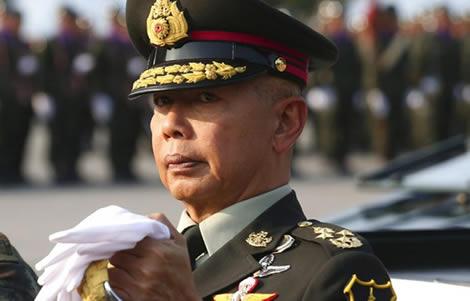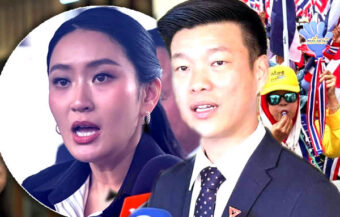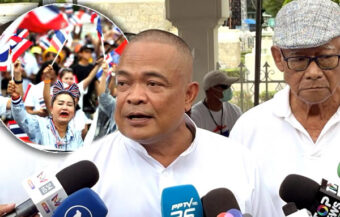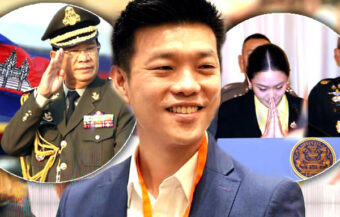To many westerners the Thai army is perceived as an anti democratic force that has a history of initiating coups against democratically elected governments in Thailand. The latest strong warning from Thailand’s army chief General Apirat Kongsompong will be listened to and filed by many foreigners in a space marked as a warning of the possibility of another coup by the Thai army if matters get out of hand politically, in Thailand, in the future. But it comes just over a week after a political party that backs ex army chief and coup leader, General Prayuth Chan ocha, surprisingly emerged as the most popular choice in the recent election if unconfirmed figures are to be believed. This week’s comments by the current army leader certainly look more like they are aimed at the new Future Forward Party that advocates left of centre, progressive politics for Thailand. Perhaps, it’s time to think more deeply about what the army general is saying. Anyone who has lived through the 2013/2014 period of instability in Thailand will appreciate the value of order, peace and harmony in a country and society. Also, isn’t it time we had a good look at where progressive politics, championed by academia, is leading the western world? Whether it is by accident or design, many Thai people today enjoy the full sovereignty of their country, something that has been lost to other nations and although muzzled and outright ignored by the western media, is painfully impacting the psyche of vast numbers within the populace of western nations which have instead, in just two decades or so, become global states.
This week, Thailand’s army chief laid out, in no uncertain terms, his view on the current political situation in the country. He warned against copying and applying western academic thinking to Thailand as a unique and proud nation and said bluntly that it would no be tolerated. The army boss, in a powerful press conference, reminded his audience that it was the duty of Thailand’s army to protect, defend and seek at all times, to maintain the key institutions and pillars of the state including the country’s religion and monarchy. To many western ears, it appeared the speech was simply a strident attack aimed at the academic and progressive policy platform put forward in the recent election by the Future Forward Party but perhaps it is time to listen to Thailand’s army leader and pay attention the voices of conservatives in Thailand. It is not as if western democracies can any longer lecture the rest of the world on how to govern for the ultimate good of the people.

Thailand’s army chief came out strongly this week to warn activists and political reformers who seek to introduce European style democracy and structures into Thailand. The army chief is known in Thailand to be deeply committed to Thailand’s traditional values which have been assiduously maintained in the kingdom despite its economic progress and rising living standards in the last fifty years.
Thailand, the land of smiles, has its own unique style of democracy and government
In a powerful and hard hitting speech this week, he hit out strongly at academics or those educated abroad in particular, for attempting to move Thailand in this direction. ‘Don’t introduce the leftist views you learned that made you all pretentious,’ he said to an assembled audience in Bangkok. The army chief indicated that such a course of action could threaten Thailand’s stability which is focused on the Thai monarchy. Many political commentators have described the monarchy in Thailand as the anchor of the nation. The General warned against adopting ideas from other countries and applying them to the kingdom. ‘This is Siam, Land of Smiles, which has its own unique style of democracy,’ he said.
Speech seen as an attack on the Future Forward Party which advocates left leaning politics
Many political experts in Thailand and indeed some political academics, have indeed interpreted the comments as a reference to the platform presented in the recent election by the Future Forward Party led by young billionaire Thanathorn Juangroongruangkit. The party emerged in third place in the March 24th election with over 80 seats even though it was only formed by is young leader in 2018, an impressive achievement. It is thought to have managed support in Thailand from younger people and in particular educated young graduates. The party was heralded by foreign and international media as a new departure for Thai politics in the lead up to election day.
Thai army and monarchy have served Thailand well over sixty years of turbulence in Asia
It should be noted that Thailand has a unique history not only in Asia but also in the world, a history that has been built around the Thai monarchy which serves to unite the country and which has served it well over the past 60 years in particular during a very challenging era. To understand the thinking of the army chief, foreigners should try to understand what he is saying without automatically dismissing it because it does not conform to attested western thinking. It must be borne in mind that Thailand emerged from the 1960s and 1970s unscathed and increasingly prosperous, from a period when communism threatened the country and reaped such devastation in other countries. This was achieved by the Thai army and the monarchy which, at one point, left Thailand internationally regarded as an ‘oasis of stability’ in the region. It should also be noted and understood that despite recurring coups, Thailand remains one of the most stable and long lasting government and administrative systems in the world that has worked uninterrupted for nearly 250 years. Many other countries in the western world cannot rival this.
Thailand has more democracy than China
It has also to be said that, given the political developments in European countries right now, Thailand’s version of democracy, while it may not conform to democracy in the western world, is looking more enhanced when we see the social strife and political division which is emerging in nearly every western democracy today over immigration and UN backed policies which are eroding national sovereignty. Thailand, today, has more democracy than China yet the international community is mute about the democratic deficit in that emerging superpower which recently signed a trade and cooperation pact with Italy, a member of the European Union.
Student activism and resultant political policies have not been positive for western countries
Many of the flaws and problems today associated with European and western democracies can be traced back to university activism in the late 1960s. It cannot, in truth be said, that the social changes since then have been an unequivocal boon for these countries and indeed it can be argued strongly that many of the populist movements emerging in the western world today seek a reversal to more traditional and national politics. Today, many western universities are promoting policies that can only be described as anti family and are, in effect, cultural marxism being introduced into societies and economies dominated by large, politically correct, corporations.
Western nations are becoming just global states following a ‘progressive’ agenda
Anyone in Thailand who has lived through the political unrest of 2013/2014 will understand why many voted for order, peace and harmony delivered by the current prime minister, in this election. Thailand today has a stable government focused on economic challenges and which has complete control over its borders thanks to a highly effective security drive. Thailand is a country with rising living standards and wealth which has seen a huge reduction in poverty since the 1980s. At the same time, the country has preserved its cultural values including a deep respect for the family unit and for seniors. It is not, at all, the country portrayed by western media stereotypes.
In the meantime, a large, voiceless proportion of the population of western nations, today, lament the loss of sovereignty suffered as their professional, university educated political class have led them to a place where instead of nations, they are now living in global states. States that, incredibly, prioritize an international agenda over the rights and livelihoods of national citizens. Thailand’s citizens are protected from this, they still own their country.
History of student politics in Thailand during the 1970s is not an inspirational one
Thailand’s army chief warned specifically about Thais returning from abroad after receiving foreign education and then desiring to apply western thinking to Thailand’s unique society and culture. While this may be anathema to the political correctness of western countries today, there is a valid argument here but you will never hear it in the western media which today is less free than the media in Thailand in some, very tangible respects. Not least to be said for the army chief’s pronouncements, is the real and urgent need for national unity and order in a country which does not have the same history and understanding of class struggle that pertains to Europe and western nations. Thailand saw, from its harrowing experience of university activism in the 1970s that such movements can result in disaster.
Army leader played a popular anti communist anthem at army bases during the election
The strong tone adopted by the army chief is in keeping with his forceful reaction, during the election, to criticism of the army’s financial budget provided for by the government and plans to trim it down proposed by the progressive Future Forward Party to fund social programs. Similar statements and policies were issued by the Pheu Thai Party and opposition figures including Khunyoung Sudarat Keyuraphan, the popular Pheu Thai Party leader who at a rally in Bangkok during the election, told the army bluntly to go back to barracks. Both parties also questioned the need for compulsory conscription in Thailand which is also the norm in Singapore and other Asian countries. It used to also be commonplace in western countries up to recent decades. The army leader was reported to have had a popular anti communist song played openly at military bases in the opening days of the election campaign to underline his viewpoint when details of such political platforms emerged publicly.
Foreign media stumped by surprise win of Palang Pracharat Party who support Prayut
The election result has surprised many, particular those in western countries, who did not foresee the emergence of democratic party that supported the policies of the National Council for Peace and Order which is the formal title for the military junta. The reaction by foreign media reporting to their domestic audiences on the night of the Thai election shows how they failed to understand Thailand and it must also be said, consistently fail to respect the country’s unique culture and traditions. To many foreigners, Thailand is a stereotype which while beautiful and a great place to holiday, is not all positive. That is simply a mistake. It is a unique, thriving and successful nation that demands and deserves respect for its own approach and vision.
Looks like Prayut will be Prime Minister but will face real political opposition in parliament
It is likely that the current Prime Minister Prayut Cano ocha will be returned as prime minister after the new parliament meets. The remaining political battles will be fought over how any government he forms navigates the lower house of Parliament where it is unlikely, at this stage, that it will have an easy working majority.
The opposition wants to form its own government but even if it cannot, it has voiced its opposition to the 2017 constitution which gives the Thai military and the establishment a lot of influence on the government policy and was, in fact, specifically designed to prevent a populist party coming to power again in a landslide.
The problem for the opposition parties is that they are now working to overturn a constitution which was approved by the Thai public in 2016. While many parties opposed the new constitution, they chose to wait until now to fight that political battle. In fairness to them, it could be said that they were constrained at voicing their opposition in 2016. The constitution was, however, approved by a decisive majority of Thai people and with a fairly impressive turnout. The result of the election also indicates that the political appetite in Thailand now is for stability.
Fears of further moves against opposition MPs and even the political parties mooted
The opposition now fears that it may lose further seats even before the official results are in. This is due to happen on May 9th. It has been suggested that some candidates may be disqualified for electoral abuse with over 100 complaints already lodged by individuals with the election commission over incidents and practices in the course of the campaign. There are also fears about the possibility investigations into the Pheu Thai Party because of its links to fugitive ex Thai Premier Thaksin Shinawatra and the leadership of the Future Forward Party. Such moves could result in further discomfort for the opposition.
Army chief highly critical of attempts to impeach Thailand’s election commission
The army chief has also come out strongly against criticism of Thailand’s election commission and recent attempts to impeach members of that body over the conduct of the March 24th election. In a colorful statement he said: ‘Once the referee has made a ruling, you blame the referees. When boxers fight, this guy loses, and you blame the referees. If it’s like this it will never end. It will be a never ending cycle of revenge and disapproval. How can it end? I’ve said already.’
Westerners should try to understand the Thai army leader’s viewpoint and conservative view
To foreigners seeking to understand Thailand, it is important to listen to what the army chief has to say. It might appear alien to western ears but this is the problem today with many western commentators, influencers and politicians and their treatment of Thailand. They fail to realize that it is a unique country that has, to a large extent, preserved its values from western influence while engaging with the outside world positively and economically.
Western nation states today simply cannot any longer argue or insist they have got it right
Who can argue today that western values and principles are fundamentally always right? What are these principles anymore as a broad and increasingly dogmatic academic agenda upends society and nations in the western world? The chaos we are witnessing in the western world today looks increasingly like the loss of nation statehood and the destructìon of the ownership of native populations in such guises as political power and even heritage. When we hear voters in the UK, France, Italy and Germany ask to ‘get back’ their country, we can say for sure that today Thai people, at least, own their own country and land. They have a state that serves primarily for the benefit of Thai people and Thai families. The have a nation. This can no longer be said for many western nation states. This and the growing prosperity of Thailand is hard to argue with even for the academic ‘experts’ who are behind many of the world’s progressive political policies.
Thailand’s army leader refused to rule out a coup if the country experiences instability
This is not the first time that the Thai army chief has warned against political moves that may lead to instability. Just after becoming the head of Thailand’s army in October, he specifically did not rule out an army coup in the future. ‘If politics does not create riots, nothing will happen,’ he said at the time in what was more of a tacit warning than a reassurance. General Kongsompong’s father, General Sunthorn Kongsompong, took part in a coup in 1991 and served as leader of another military junta at the time for over 1 year.


















